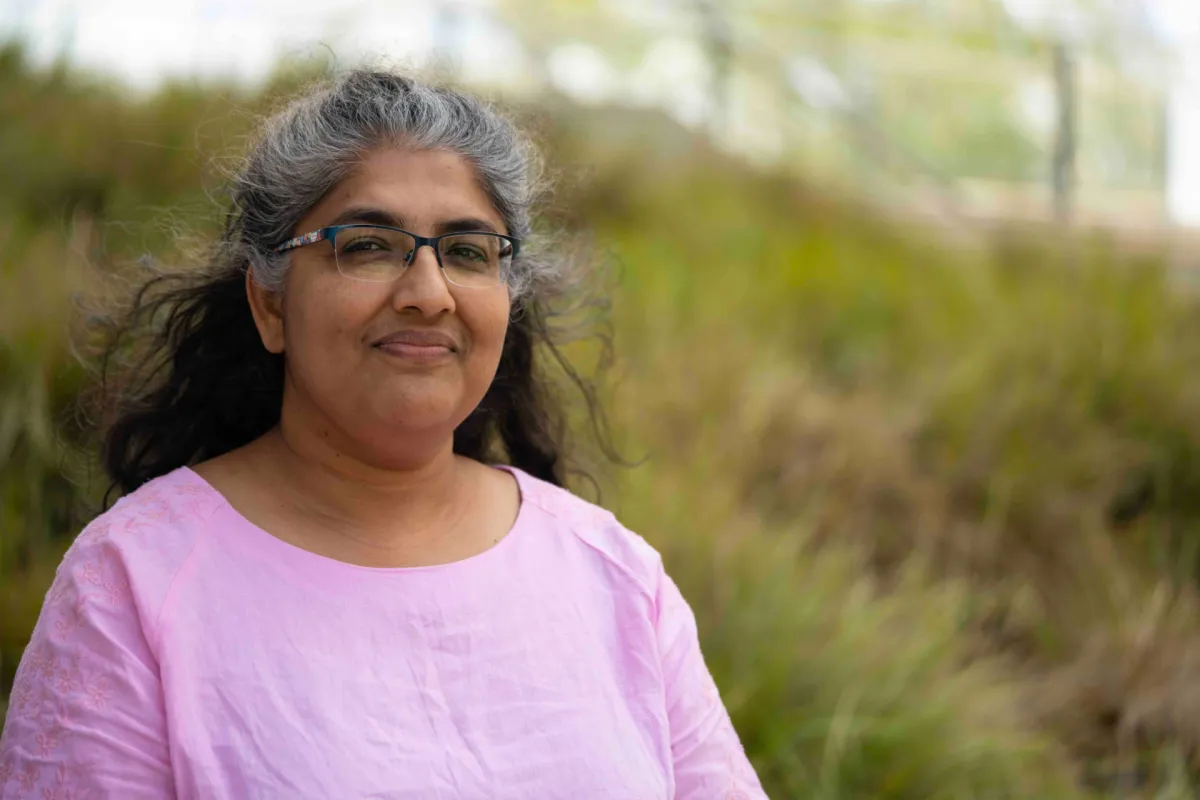Speaking up

“When facts are ignored you need to speak up for change.” Kamalini Lokuge – doctor, humanitarian, researcher, activist. Liz Drummond reports.
Associate Professor Kamalini Lokuge arrived in Kabul, Afghanistan, when she was 26 years old, and the Taliban had just overthrown the government. Having recently qualified as a doctor, she had joined Médecins Sans Frontières (MSF) to expand her horizons beyond the medical centres of Canberra.
“I was treating people with infectious diseases, malnutrition, mine injuries, and a host of other preventable conditions. It was frustrating because so many of these problems were avoidable if people had decent living conditions and access to healthcare,” says Kamalini.
It wasn’t just illnesses that Kamalini had to battle but also societal customs, in this case, an ingrained patriarchal society.
“Not allowing female doctors to practise medicine meant that women simply didn’t go to clinics. I remember one woman only having the courage to seek help when I began working there. This meant that by the time she received care, her breast cancer had eaten into her chest wall,” says Kamalini.
Academia is one of the places you are truly free to speak based on evidence.
Kamalini’s life-long career in advocating for better health practices began here in Kabul with a series of negotiations with a Taliban governor to allow female staff in their most remote clinic. He refused to meet with her face-to-face, however, and they talked through a window.
“Three weeks later, after much cross-window discussion, he announced that the Koran decreed women had an equal right to healthcare, and I was allowed to employ women,” says Kamalini.
Working in Afghanistan and other conflict and disaster settings gave Kamalini a broader understanding of healthcare systems and the challenges they faced. She realised that to be a better doctor she had to find a way to stop people getting sick in the first place, and have better access to healthcare if they did.
Kamalini’s vision to facilitate change led her to study both public health and international law at ANU. With public health, she could understand more about the contexts in which her patients live and international law would train her to be their advocate.
It is this advocacy for better public health which has brought Kamalini into the spotlight as an activist.
“I think ‘activist’ has become a dirty word, particularly for academics,” says Kamalini.
“It is a great disservice if scientists self-censor because they want to be seen as being objective. They may have the idea that being a good scientist means presenting the facts and nothing more. I don’t agree. If our research supports an argument, it is important we say this.”
Kamalini cites an example of data-driven change when she worked early in the West African Ebola outbreak, where it was clear that existing reporting systems were missing cases.
“We brought evidence of this problem to MSF decision makers, and were then able to obtain resources for contact tracing which is essential in identifying and controlling transmission.”
Kamalini and her team are currently working with MSF and the Ministry of Health and Sanitation on maternal and child health in Sierra Leone, a setting that has seen the world’s highest maternal mortality for a long time.
The team’s voice has been heard once again, this time in a bid to save mothers and their children in childbirth.
“We only recently started work there but are already having an impact. The data we collected has supported our partners to successfully advocate for more obstetric staff. This is absolutely critical to improving maternal health,” says Kamalini.
“To me this is evidence-based activism. Making sure our research is of high quality, accessible and utilised.”
Speaking out alone can be difficult, however, and Kamalini is a strong supporter of working in teams.
“I work in a team with the best epidemiologists, anthropologists, statisticians, policy analysts and modellers, and with partners who prioritise evidence-based decision making. Speaking collectively is easier, and ultimately more powerful,” says Kamalini.
This collective ideal is reflected in Kamalini’s partnerships across research institutions, ministries of health, non-government organisations, and local healthcare providers.
“We research what our partners and those who will utilise our research think is important. It starts by listening to what people have to say about problems and solutions, and applying research expertise to assessing and evaluating this,” says Kamalini.

In Papua New Guinea (PNG) for example, a setting where the majority of women experience gender-based violence, Kamalini received feedback from nurses and counsellors that women needed more than just healthcare.
“Survivors wanted support accessing safety, protection and justice. We took this information on board and together with my PNG and ANU colleagues we founded Femili PNG, a local NGO which has since helped over 1,400 women and children,” she says.
Kamalini is a firm believer that researchers and academics have a responsibility to make their voices heard. Her work around the world has demonstrated the success of listening to those in need, and using evidence to stand up for what she believes in.
“Ultimately we are funded by the taxpayer, the community and philanthropic donors to make a difference. Our job doesn’t end when we publish a paper. It is our responsibility to make our work accessible, and use it to help instigate change,” says Kamalini.
“Academia is one of the places you are truly free to speak based on evidence. If this makes me an ‘activist’, then I embrace it.”
Associate Professor Kamalini Lokuge is Senior Research Fellow and Lead, Humanitarian Health Research Initiative, ANU College of Law, Governance and Policy.
This article was orginally published in ANU Reporter magazine.
